#Olive oil Arab
Explore tagged Tumblr posts
Text
Olive Oil Arab: Exploring the Richness of Arab Olive Oil
Introduction
Olive oil has been an integral part of Arab culture for centuries, deeply rooted in tradition and cherished for its numerous benefits. Arab regions boast a rich history of olive cultivation and oil production, with distinct flavors and aromas that set them apart. In this article, we will delve into the world of Olive Oil Arab, exploring its history, production process, health benefits, culinary uses, skincare applications, economic significance, and more. So grab a bottle of Olive Oil Arab and join us on this flavorful journey.
1. The History of Olive Oil in Arab Culture
Olive oil Arab holds significant cultural importance in Arab traditions, dating back thousands of years. Its origins can be traced to ancient civilizations such as the Phoenicians and Egyptians. Arab regions, with their favorable climate and fertile lands, became ideal for olive cultivation. The olive tree became a symbol of prosperity, peace, and purity in Arab culture, and its oil was highly valued for its versatility and health benefits.
2. The Olive Varieties in Arab Regions
Arab regions are home to a wide variety of olives, each contributing to the unique flavors and characteristics of Olive Oil Arab. Some of the popular olive varieties include:
Manzanilla
Nabali
Souri
Chemlali
Picual
Barnea
Each variety possesses distinct taste profiles, ranging from fruity and mild to robust and peppery. The careful selection and blending of these olives during the production process result in a wide range of flavors to suit different palates.
3. The Production Process of Arab Olive Oil
The production process of Olive Oil Arab is steeped in tradition, emphasizing quality and authenticity. It involves several key steps, including:
Harvesting
Olive trees are carefully tended, and the olives are harvested at the optimal stage of ripeness. Traditional methods involve handpicking, ensuring that only the best olives are chosen for oil extraction.
Pressing and Extraction
The freshly harvested olives are washed and then crushed to create a paste. This paste is then pressed to extract the precious olive oil. The traditional method of cold pressing ensures minimal heat is generated, preserving the oil's natural flavors and nutrients.
Filtration and Bottling
After extraction, the oil undergoes filtration to remove any impurities, ensuring clarity and purity. It is then carefully bottled to protect its freshness and quality.
4. Health Benefits of Olive Oil Arab
Olive Oil Arab offers a multitude of health benefits, making it a staple in many diets. Some notable advantages include:
Rich in Antioxidants
Olive Oil Arab is rich in antioxidants, such as vitamin E and polyphenols, which help protect the body against oxidative stress and inflammation.
Heart-Healthy Properties
Regular consumption of Olive Oil Arab has been linked to a reduced risk of heart disease due to its high content of monounsaturated fats, which can help lower bad cholesterol levels.
Anti-Inflammatory Effects
The anti-inflammatory properties of Olive Oil Arab can aid in reducing inflammation within the body and potentially alleviate symptoms of chronic diseases.
Digestive Health
Olive Oil Arab has been known to promote healthy digestion and aid in the absorption of essential nutrients.
5. Culinary Uses of Olive Oil Arab
Olive Oil Arab is a prized ingredient in Arab cuisine, adding depth and flavor to a wide range of dishes. Here are some popular culinary uses:
Salad Dressings and Dips
The smooth and fruity notes of Olive Oil Arab make it an excellent choice for creating delicious salad dressings, marinades, and flavorful dips like hummus and baba ganoush.
Sautéing and Frying
The high smoke point of Olive Oil Arab makes it suitable for sautéing and frying, imparting a delicate taste to vegetables, meats, and seafood.
Baking and Desserts
In baking, Olive Oil Arab can be used as a healthier alternative to butter, adding moisture and a subtle fruitiness to cakes, cookies, and pastries.
6. Beauty and Skincare Benefits of Olive Oil Arab
Apart from its culinary uses, Olive Oil Arab offers various beauty and skincare benefits. Its natural properties make it a versatile ingredient for nourishing the skin and hair. Some benefits include:
Moisturization and Nourishment
Olive Oil Arab contains essential fatty acids and vitamins that deeply moisturize and nourish the skin, promoting a healthy complexion.
Makeup Remover
Gently removing makeup is made easier with Olive Oil Arab. Its gentle yet effective cleansing properties make it suitable for all skin types.
Hair Conditioning
Applying Olive Oil Arab to the hair can help improve shine, manageability, and reduce frizz. It also provides nourishment to the scalp, promoting healthier hair growth.
7. The Economic Importance of Olive Oil Arab
Olive Oil Arab holds significant economic importance in the Arab region, contributing to both domestic and international markets. It supports the livelihoods of numerous farmers, producers, and exporters, playing a vital role in the local economies. The demand for high-quality Olive Oil Arab continues to grow globally, further boosting the industry's economic significance.
8. Sustainability and Environmental Impact
The cultivation and production of Olive Oil Arab emphasize sustainable practices, ensuring the preservation of natural resources and the environment. Traditional farming methods, such as terracing and dry farming, minimize water usage and soil erosion. Additionally, many producers prioritize organic farming techniques, reducing the use of pesticides and promoting biodiversity.
9. Popular Brands of Olive Oil Arab
When exploring Olive Oil Arab, it's worth considering some of the popular and reputable brands available. These brands prioritize quality and authenticity, offering a wide range of flavors and characteristics to suit different preferences. Some well-known brands include:
Al Wadi Al Akhdar
Zaituna
Al Badawi
Ode to Olive
Jordan Farms
10. Tips for Choosing and Storing Olive Oil Arab
To ensure you select the best Olive Oil Arab and preserve its freshness, consider the following tips:
Look for certifications and labels indicating authenticity and quality.
Opt for dark glass bottles to protect the oil from light and maintain its flavors.
Store Olive Oil Arab in a cool, dark place away from direct sunlight and heat sources.
Use the oil within its recommended shelf life to enjoy its optimal taste and nutritional benefits.
11. How to Incorporate Olive Oil Arab into Your Daily Life
Incorporating Olive Oil Arab into your daily routine is simple and rewarding. Here are some ideas to get you started:
Drizzle Olive Oil Arab over salads, roasted vegetables, or grilled meats for a burst of flavor.
Use it as a finishing oil to enhance the taste of soups, stews, and pasta dishes.
Create a homemade facial or hair mask by combining Olive Oil Arab with natural ingredients like honey, yogurt, or avocado.
Substitute Olive Oil Arab for butter or other oils in your favorite baking recipes for a healthier twist.
12. Myths and Misconceptions About Olive Oil Arab
There are several myths and misconceptions surrounding Olive Oil Arab. Let's debunk some of the common ones:
Myth: All Olive Oil Arab tastes the same.
In reality, Olive Oil Arab comes in various flavors and characteristics, depending on the olive varieties used, the production methods, and the region of origin.
Myth: Olive Oil Arab cannot be used for frying.
Contrary to this belief, Olive Oil Arab has a high smoke point, making it suitable for frying and sautéing at moderate temperatures.
Myth: Olive Oil Arab loses its health benefits when heated.
While excessive heat can degrade the quality of any oil, Olive Oil Arab retains many of its health benefits when used in cooking, thanks to its high content of monounsaturated fats and antioxidants.
13. Olive Oil Arab in the Global Market
Olive Oil Arab has gained recognition and popularity in the global market. Its unique flavors, cultural heritage, and health benefits have made it a sought-after culinary and wellness ingredient worldwide. The demand for Olive Oil Arab continues to grow, providing economic opportunities and promoting cultural exchange.
Conclusion
Olive Oil Arab is more than just a culinary staple. It represents the rich heritage, cultural significance, and health-promoting properties of Arab regions. From its historical roots to its versatile applications in cooking, skincare, and beyond, Olive Oil Arab invites us to embrace its flavors and benefits. So, next time you reach for a bottle of olive oil, consider exploring the diverse and vibrant world of Olive Oil Arab.
Frequently Asked Questions (FAQs)
Q1. Can Olive Oil Arab be used for deep frying?
Yes, Olive Oil Arab can be used for shallow frying and deep frying due to its high smoke point and stability at high temperatures. However, it is recommended to use it in moderation and follow proper frying techniques.
Q2. How long does Olive Oil Arab last?
The shelf life of Olive Oil Arab can vary depending on factors such as the quality of the oil and how it is stored. On average, it can last up to two years when stored properly in a cool, dark place.
Q3. Is Olive Oil Arab suitable for all skin types?
Yes, Olive Oil Arab is generally suitable for all skin types. However, individuals with specific skin concerns or allergies should perform a patch test before using it extensively.
Q4. What makes Olive Oil Arab different from other types of olive oil?
Olive Oil Arab is distinguished by its unique flavors, which are influenced by the specific olive varieties grown in Arab regions and the traditional production methods employed. It offers a diverse range of taste profiles, setting it apart from other olive oils.
Q5. Where can I purchase authentic Olive Oil Arab?
Authentic Olive Oil Arab can be purchased from specialty stores, local markets in Arab regions, or reputable online retailers. Look for certifications and labels that guarantee the authenticity and quality of the product
0 notes
Text
A Palestinian grandfather protects his thousand year old olive trees from IOF soldiers, trying to raze his land. This is the brutality of the Israeli Zionist regime. Trying to erase every thing that is Palestinian from this land. The earth in Palestine belongs to us and it will not forget. No matter how many trees they uproot.
#palestine#free palestine#olive oil#Olive trees#arabic#gaza#jerusalem#israel#فلسطين#free gaza#i stand with palestine
86 notes
·
View notes
Text

certified halal kanan bc he’s arab to ME
#ik he’s jewish coded and i love that for him too#but he really resonates with me as arab for some reason… idk#anyway be halal like kanan#halalcore#star wars#star wars shitpost#kanan jarrus#star wars rebels#NOOOOO MY PHOTOSHOP TAG DISAPPEARED :((#sigh.#rip my og photoshop tag i’ll forever miss you#kanan is so halal mashallah#in arabic there’s a name very similar to kanan and it’s “kenan” (pronounced kee-naan)#anyway i pronounce kanan’s name very similar lol#extra virgin olive oil#why is he doing the rizz face
161 notes
·
View notes
Text


Making you all look at Araboromir again because I love him so so much
#this is a coping mechanism#dipping my Blorbos in olive oil#lotr headcanons#lotr arab#lotr fanart#Boromir#boromir fanart#lord of the rings
21 notes
·
View notes
Text
my fiancé thinks falafel is healthy 😆🤦♀️
#Arab in America#Just MENA things#🇵🇸#🇱🇧#🇸🇾#I guess it is mostly olive oil#cooking#falafel#I love the sound of cooking oil#But no#Fried bean dough balls are not health food
6 notes
·
View notes
Text
One thing I hate about no longer being in southern europe is instead of going to the supermarket and having ~10 olive oils to choose from, I have 2 olive oils and 8 bottles of bizarre flavoured stuff (with truffles! with rosemary! with figs - HOW ABOUT WITH FREAKING OLIVES)
#tbd#very silly minor rant#also sorry italians but i don't know italian olive oil and I've been burned with liquid acid before#so i avoid the italian ones like the plague#which leaves me with zero options in normal supermarkets#and chasing down greek/portuguese/spanish/arabic shops instead
1 note
·
View note
Text
[ Original Twitter Thread by @/beelektra ] - Not by Magz, am not Palestinian
Palestinian Foods. (long post)
Quote:
"🧵 Thread of Palestinian desserts I've grown up around and seen A thing I'd like to add is that I just like to share my culture! I do not want to spread the narrative that our culture is dying, I only want people to see our foods and traditions 🇵🇸
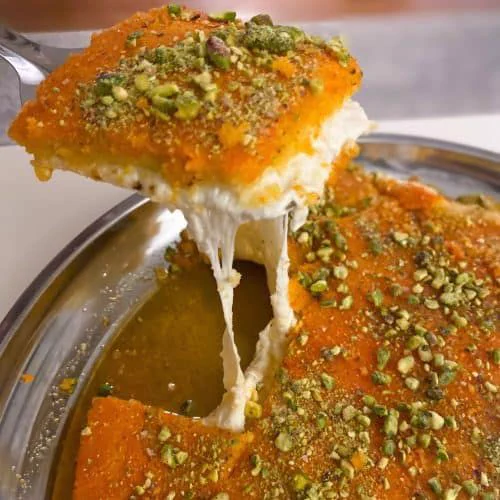
"As mentioned in the last post, we have knafeh (or kunafa), a buttery dessert made with shredded pastry layers such as cheese and other ingredients like pistacho or cream!"
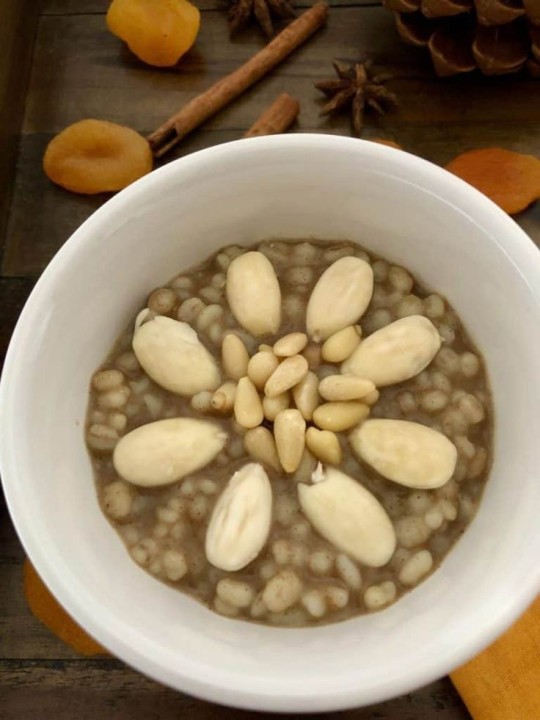
"Burbara; which comes from Saint Barbara, fun fact! It's a soup dessert that mainly consists of barley, licorice spices, anise, cinnamon, and fennel powder This is a dessert usually many Christian families have to celebrate Saint Barbara, which is December 4th!"
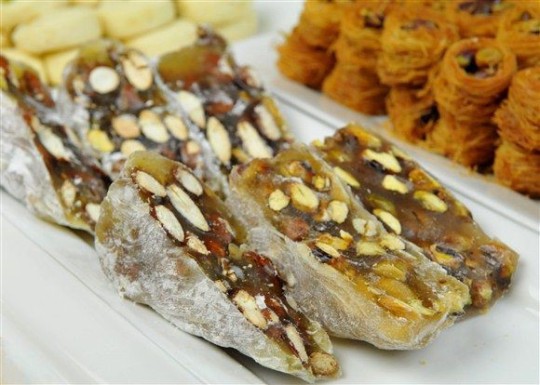
"Malban, which resembles a fruit jelly! Made from starch and sugar Specifically, it's made with grape molasses, thickened with starch and flavored with rose water, and stuffed with almonds (or other nuts including walnuts, treenuts, and peanuts)"
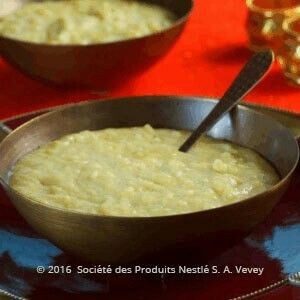
"Khabeesa is simply just a pudding made with grapes, but you prepare it by mixing the grape juice with semolina and nuts + seeds."
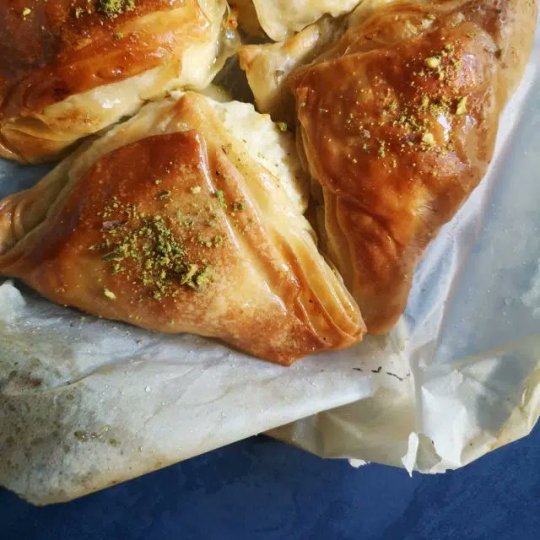
"Mtabbak or mtabba, a crispy dough stuffed with crushed walnuts. It also contains cinnamon, sugar, and syrup. Photo credits go to Bartek Kieżun on Instagram"
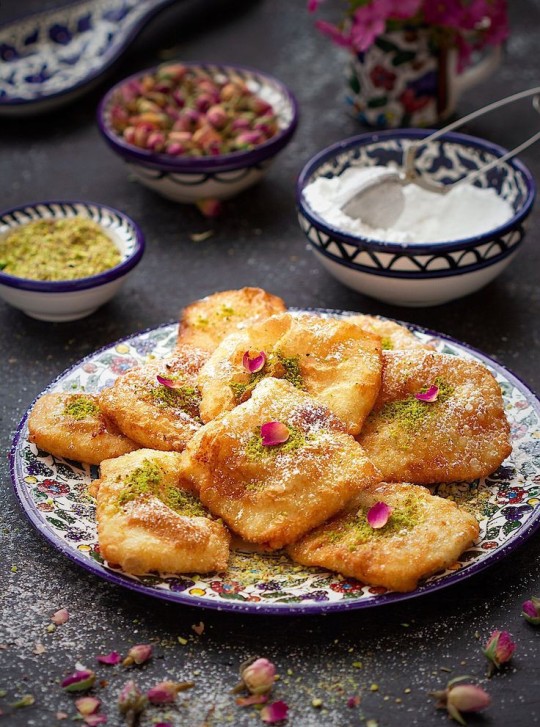
"Tamriyeh, a fried pastry filled with semolina pudding, scenter with mastic and orange blossom water, and topped off with powdered sugar"
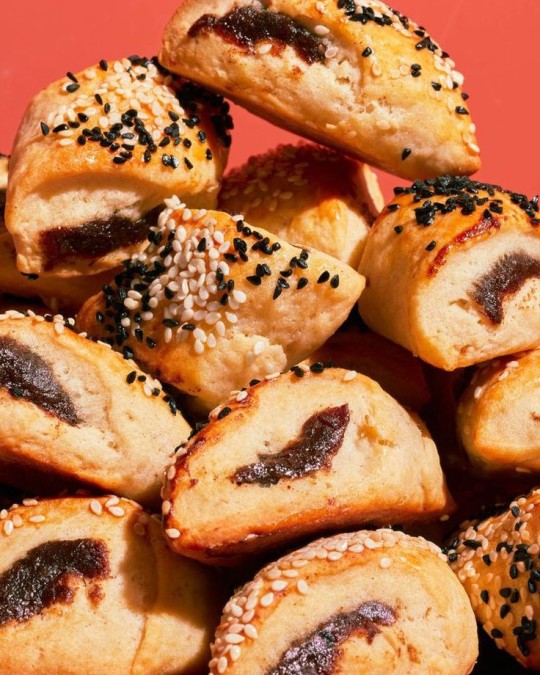
"Ka'ak bi Tamer, which are date paste filled cookies with cinnamon! A dessert made for Eid-Alfitr. It's topped with nigella seeds, and the cinnamon-spiced date paste is the most important part of it all– you can eat it on its own or have it with coffee"
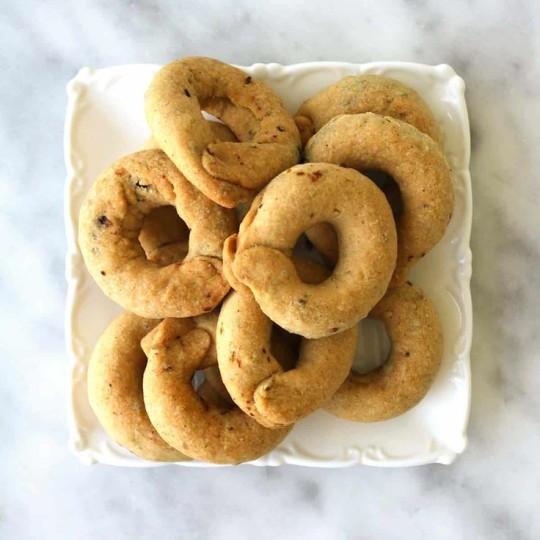
"+ Ka'ak Asawer, another dessert that can be prepared for Eid-Alfitr. It's translated to bracelet cookies, and they use date paste, flour, anise seeds, sugar, ground cinnamon, and olive oil"
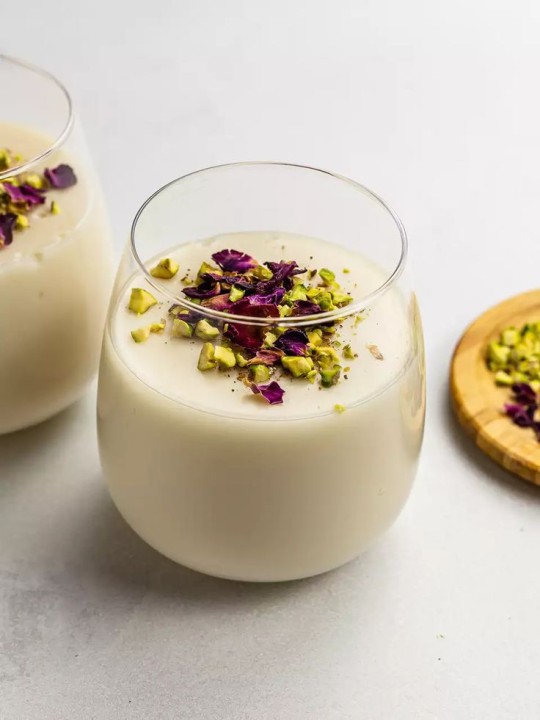
"Muhallebi or mahalabia, a milk pudding that's made with sugar, corn starch, and fragrant flavorings! It's topped off with nuts, pistachos, and almonds and sprinkled with ground cinnamon or shredded coconut"
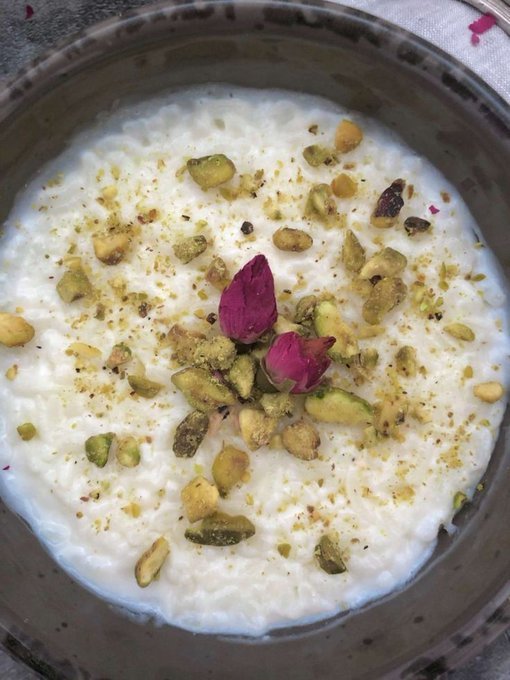
"Rice pudding, which is a common dessert in Palestine, and it's your choice to top it off with nuts or not"
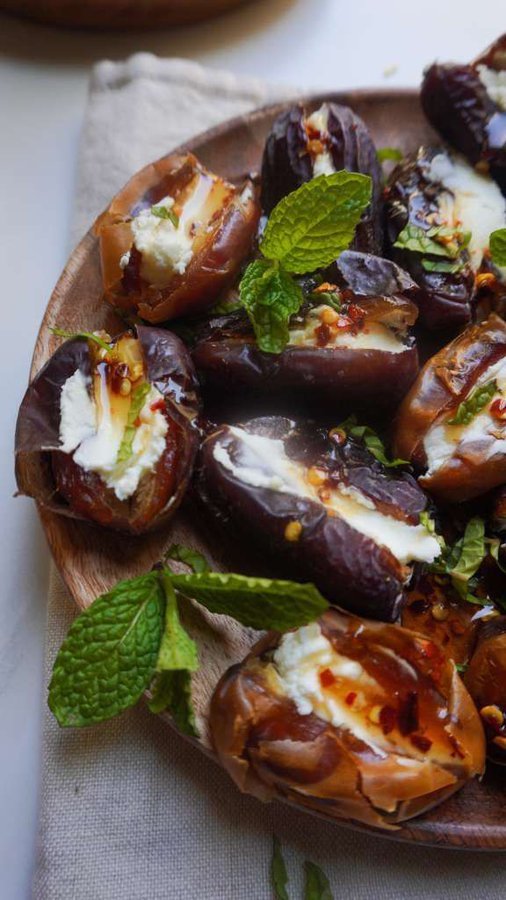
"Stuffed dates, using medjool dates and cracking them open to be stuffed with goat cheese and pistachios– but you're free to add anything else"
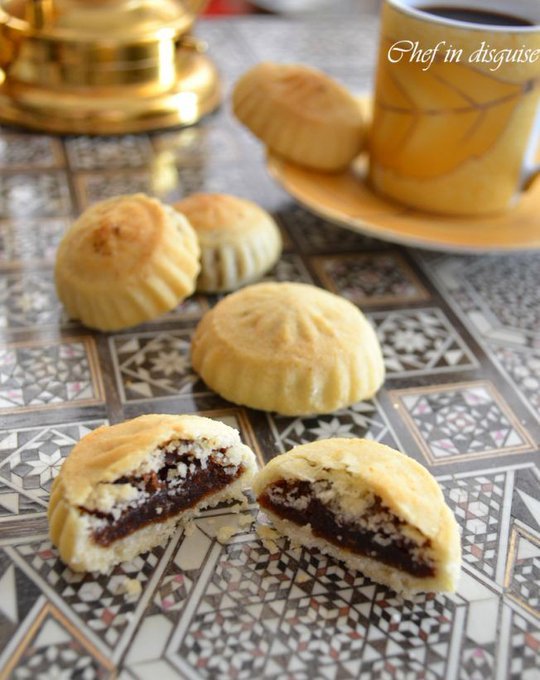
"Ma'amoul, a buttery crisp cookie primarily made of farina and can be stuffed with (spiced) dates, walnuts, or pistachios. This is another Christian dessert made by Palestinian mothers during the week of Easter Sunday."
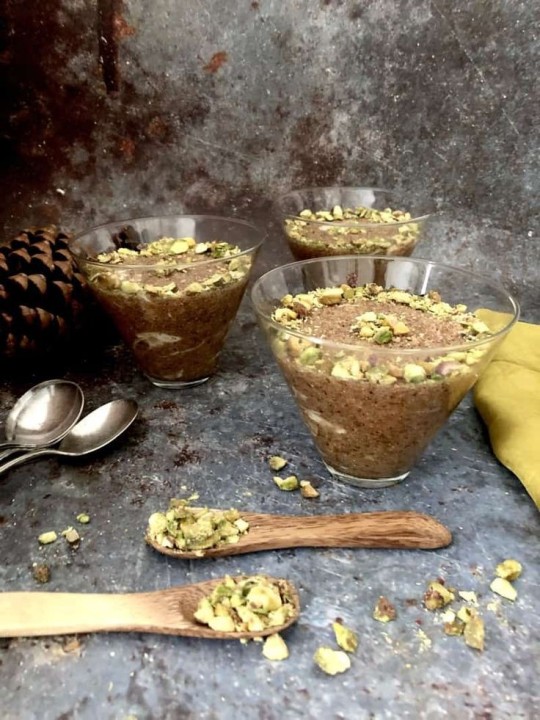
"Halawit Smid, a farina based dessert with added sugar and unsalted cheese. It's preferably served fresh"
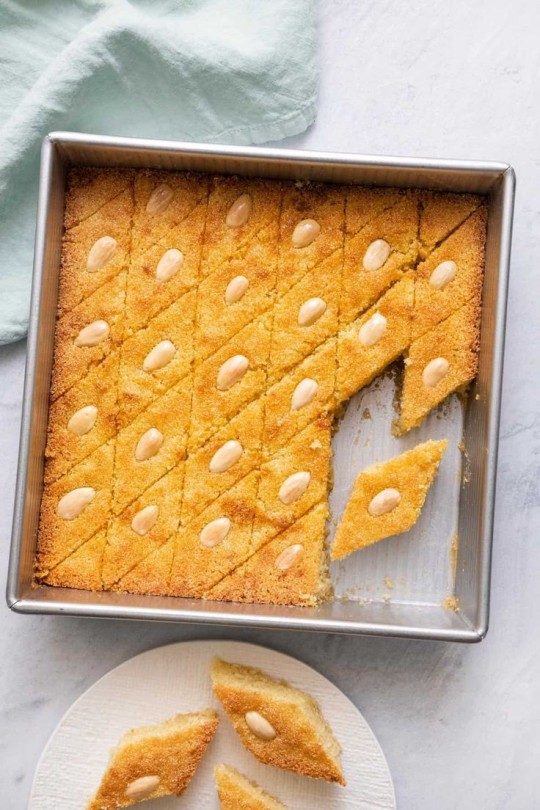
"Namoura cake, aka harissa dessert! It's made with semolina or farina flour, and then topped off with syrup once baked"
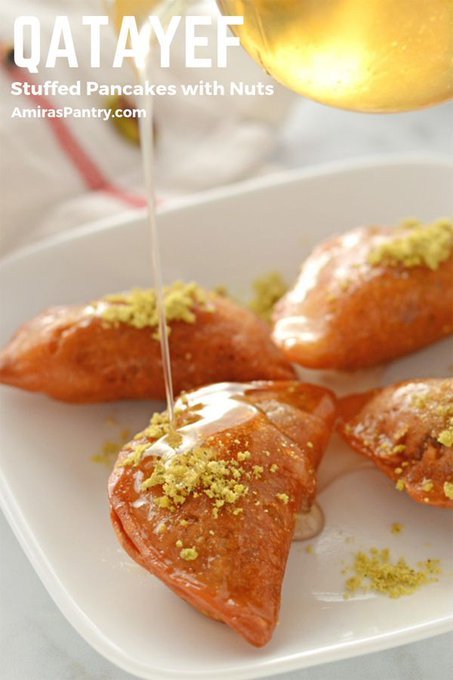
"Qatayef, which is eaten during the month of Ramadan. It's made of farina, flour, water, and yeast blended together– the process is pretty similiar to making pancakes, but only one side is cooked"
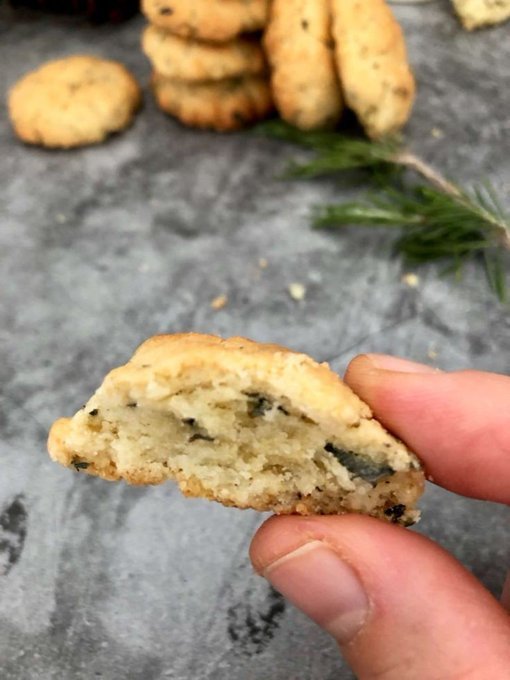
"Since I've mentioned using zaatar for a lot of things, I recently just discovered this but– there's also things such as zaatar cookies!! It's just as implied that the cookies are filled with zaatar, I'd be so willing to make this on my own"
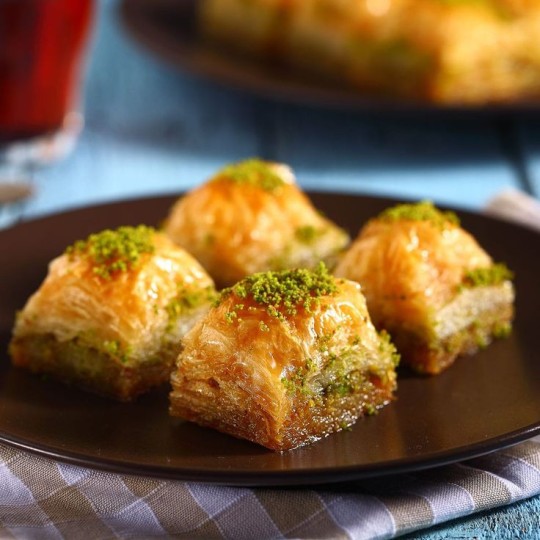
"Baklava, made from phyllo pastry dough, butter, nuts, basil, and a sweet honey syrup"
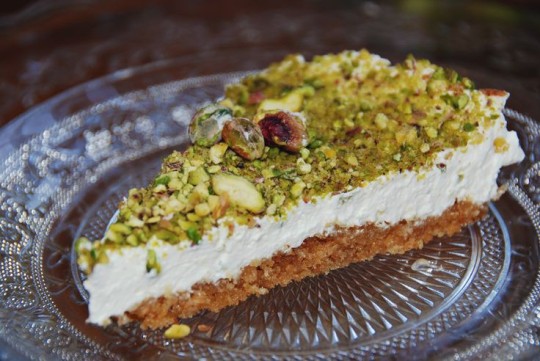
"Aish el saraya, arabic version of a bread pudding. It's basically a layered bread, where it starts from the bottom, then covered with a sweet syrup, cream, and crumbled pistachios."
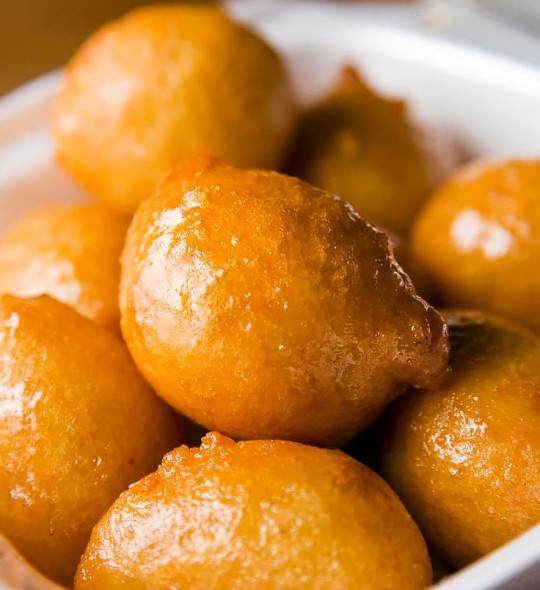
"Awwami, it's defined as "crisp donut ball" in English. It's a deep fried dough ball coated with sesame seeds, and dipped in cold syrup water."
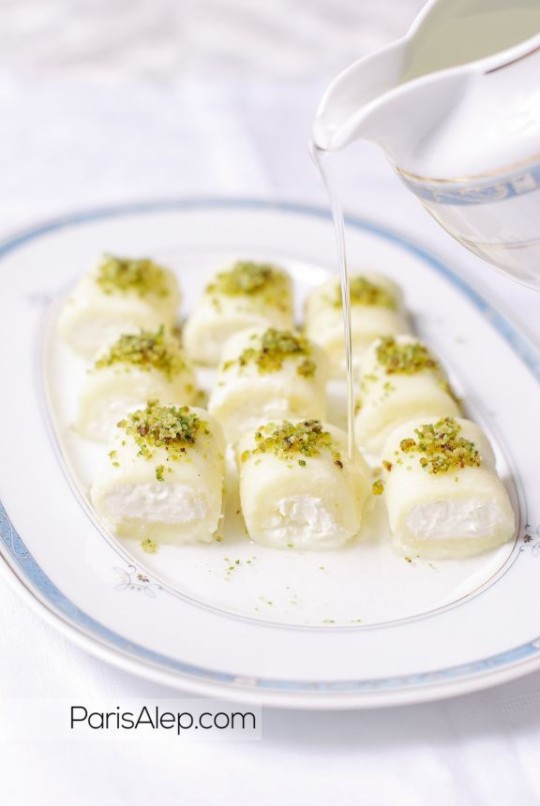
"Halawet el Jibn, a sweet cheese dessert rolled with custard, heavy cream, drizzled rose water + syrup, and garnished with nuts."
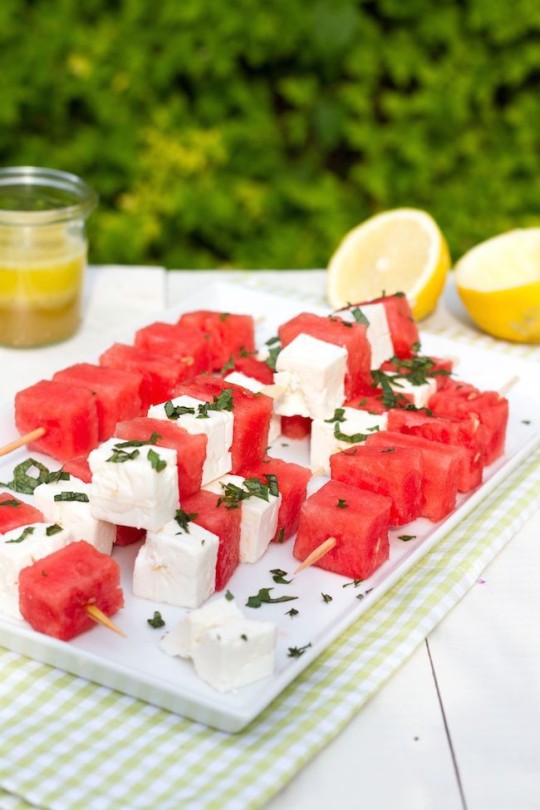
"Lastly, I'd like to add watermelon and cheese– for me, it's like,,,, bittersweet!!! You should totally try it and we also have this during Ramadan"
"Well, that's all I can think of for Palestinian desserts! Here's the first part for general foods, I know I did make a promise for part two
I hope you guys liked this thread, and if you have any opinions please feel free to quote tweet anything on here if I made a mistake, feel free to correct me, it's always appreciated P.S if you're a zionist commenting here I really don't care, just scroll, I'm sharing my culture
One LAST thing. if you want any of the recipes from here, check out this website, the creator (Wafa) shares so many wonderful traditional Palestinian dishes."
[End Quote]
7K notes
·
View notes
Text
Everyday Ways I Honour Aphrodite
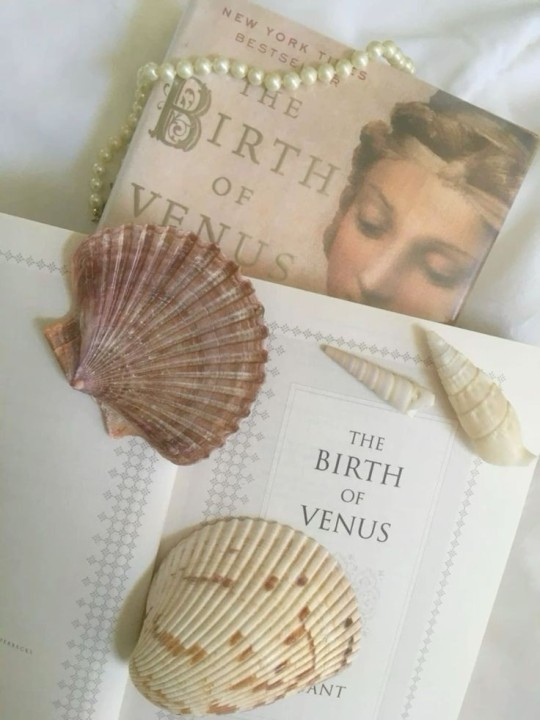
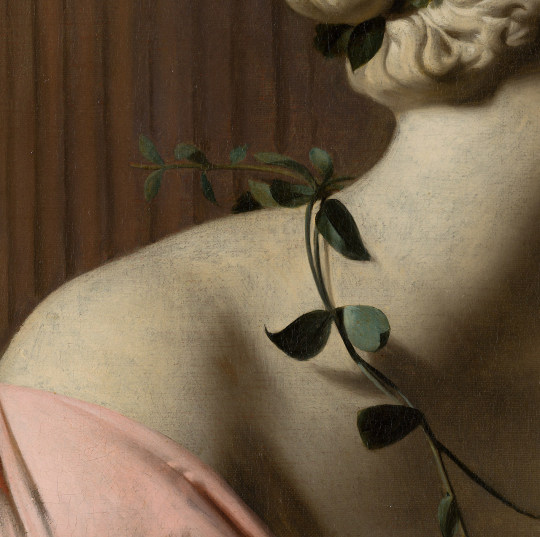
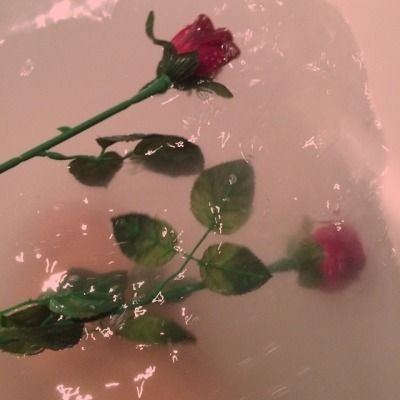
(NSFW warning)
🌹Roses, roses, roses. Rose soap, rose lip balm, rose hand cream, rose lotion, rose perfume, rose oil on my pillow before falling asleep, rose candles, rose incense, roses in my garden, rosewater toner, rose face mist, rose shower gel, dried roses in the bath... Just roses everywhere you can fit them.
🌹Reading romantic books and poetry, watching romance films
🌹 Reading books and poetry about Aphrodite
🌹Making myself feel beautiful with pretty jewellery and makeup. Even just a swipe of tinted lip balm boosts my confidence (I use French Girl Rose Noir). I try to wear at least a little bit of makeup or jewellery daily, even if it's just a pair of studs or a subtle lipstick
🌹 Even if I'm just staying at home all day I'll spray perfume and put on jewellery and do lipstick just to feel sensual while I'm lounging around playing Animal Crossing (currently wearing a comfy embroidered nightie, small gold hoops, a pretty bracelet and a little bit of YSL Orange Perfecto lipstick as I write this)
🌹 Embracing my sensuality. Swaying my hips, feeling the softness of my body, dancing freely, engaging in self-pleasure, taking nudes, trying to unlearn the shame associated with sexuality from my upbringing. I don't watch porn often as I find most of it unhealthy and misogynistic (I only like this one random Japanese couple's channel and some vintage and Korean softcore), but I enjoy toys (my favourite is the rose), erotic literature, erotic film, audio porn (usually in other languages because I find a lot of dirty talk just makes me cringe but I still get enjoyment out of hearing little moans and silky low voices so I get that and avoid secondhand embarrassment from bad dirty talk by listening to it in languages I don't understand), and erotic fine art.
🌹 I try to get really comfortable when I'm engaged in self love. Lipstick and perfume on, hair styled, lingerie or nightie that makes me feel sexy, a candle lit or rose, ylang ylang and jasmine oil in my diffuser, soft music playing. Then I'll position myself comfortably, and stroke my thighs, tease my nipples, squeeze my breasts, lick my juices off my fingers and use it like a lipstick, painting my lips and nipples or using it to lightly lubricate my clitoris. Running my hands all over my belly, thighs and breasts, experimenting with different types of pressure and stimulation. Just luxuriating in the sensual feelings I can bring to my beautiful female body.
🌹 Wearing jewellery with seashells, pearls, emerald, ruby, bronze, copper, gold, jade, garnet and iridescent beads
🌹 Enjoying apples, honey, figs, pomegranates, strawberries, raspberries, olives, lettuce, rosewater and chocolate. I like buying Guylian chocolates as they're seashell shaped, but any chocolate will do (my favourite chocolate bar to buy is white chocolate with strawberries). I also like foods that you can taste the rosewater in like rose macarons and Turkish delight.
🌹 Making foods with ingredients she likes, like honey cakes, Persian rose love spell cookies, rosewater nougat, Persian love cake, baklava, cornes de gazelle, mhencha, etc... I mostly stick to Mediterranean, North African, Arab and Persian recipes, as they commonly use ingredients like rosewater, honey, pomegranates, and figs.
🌹 Carrying rose quartz in my pocket and keeping rose quartz under my pillow
🌹 I use a rose quartz roller to massage oil into my face
🌹 I keep a mini Venus de Milo statue and a swan trinket box on my bedside table
🌹 Drinking a drink made up of honey, cinnamon, milk and hot water at night to relax
🌹 Wearing pretty lingerie under my clothes, even if it's a basic outfit
🌹 I often fall asleep to the sound of ocean waves
🌹 Gold highlighter swept on my cheeks and body shimmer on my collarbones, reflecting light like sun rays on the ocean
🌹 Doing little offerings, like spritzing her statue with perfume, or offering up a portion of food I'm eating that I think she'd like
🌹 Lighting incense in scents like myrrh, frankincense, rose, vanilla, cinnamon, ginger and jasmine
🌹 Drawing myself relaxing baths with fragrant oils and salts
🌹 Reading hymns, Sappho's poetry, and listening to Athanati Afroditi
🌹 Listening to music that's romantic or sensual (this is my playlist)
🌹 Carrying a hand mirror and admiring myself as I check my makeup
🌹 Adding honey to tea
🌹 Writing letters and poetry about love and beauty
🌹Admiring women I find beautiful without jealousy or resentment, just appreciation
🌹Using these emojis: 🌹🦢🌊🪞🍎❤️💘💗💕💋🕊️🫒💄
🌹 Wearing pink, red, aqua, and seafoam green
🌹 Being consistent in self care. No matter how low my spoons are, unless I'm so dog-tired I end up falling asleep on the couch at 8pm, I force myself to do my evening skincare routine - cleansing, toning, eye cream, moisturiser, oil. And I always feel better for it even if I was exhausted before. Much smaller but I'm also consistent in oiling the ends of my hair daily and spraying perfume before bed. And I keep up with getting my hair done and brows waxed every three months without fail.
🌹 Doing exercises that make me feel sensual. I'm really lazy tbh but I push myself because I know Aphrodite would want me to take care of my body. I pick exercises that make me feel good and desirable, like yoga flow, belly dance, and exercises that target my womanly attributes.
🌹 Giving compliments!
🌹 Doing a big self care day every Friday (the day associated with her). Hot oil hair treatment, foot soak and exfoliation, removing old nail polish and buffing and filing nails, face mask, teeth whitening....
🌹 Going to the pond in winter and admiring the swans
🌹 Going to an art gallery in my city just to look at the painting Venus and Cupid (Day) by Fragonard
🌹 Sleeping on silk sheets as they feel sensual (they're also good for your hair and skin)
🌹 Making my own diffusers and cosmetics from natural, aphrodisiac products. Homemade bath salt with rose petals and pink salt, homemade lip mask with olive oil and rose oil, and adding oil of rose, jasmine, sandalwood, and cinnamon to a diffuser as I find these scents stimulating and sensual.
🌹 And of course, thanking Lady Aphrodite every day.

#gods#Aphrodite#hellenic deities#hellenic pagan#hellenic worship#hellenism#paganism#witchblr#aphrodite devotee#aphrodite devotion#aphrodite worship#aphrodite offerings#aphrodite altar#aphrodite aesthetic#aphrodite goddess#self care
902 notes
·
View notes
Text
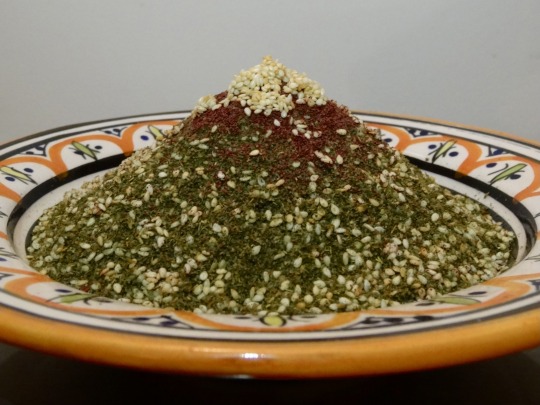
[ID: A decorative orange ceramic plate with a pyramid of green herbs and sesame seeds, topped with deep red sumac and more sesame seeds. End ID]
زعتر فلسطيني / Za'tar falastinia (Palestinian spice blend)
Za'tar (زَعْتَر; also transliterated "za'atar," "zaatar" and "zatar") is the name of a family of culinary herbs; it is also the name of a group of spice blends made by mixing these herbs with varying amounts of olive oil, sumac, salt, roasted sesame seeds, and other spices. Palestinian versions of za'tar often include caraway, aniseed, and roasted wheat alongside generous portions of sumac and sesame seeds. The resulting blend is bold, zesty, and aromatic, with a hint of floral sourness from the sumac, and notes of licorice and anise.
Za'tar is considered by Palestinians to have particular national, political, and personal importance, and exists as a symbol of both Israeli oppression and Palestinian home-making and resistance. Its major components, olive oil and wild thyme, are targeted by the settler state in large part due to their importance to ecology, identity, and trade in Palestine—settlers burn and raze Palestinian farmers' olive trees by the thousands each year. A 1977 Israeli law forbade the harvesting of wild herbs within its claimed borders, with violators of the law risking fines and confiscation, injury, and even death from shootings or land mines; in 2006, za'tar was further restricted, such that even its possession in the West Bank was met with confiscation and fines.
Despite the blanket ban on harvesting wild herbs (none of which are endangered), Arabs are the only ones to be charged and fined for the crime. Samir Naamnih calls the ban an attempt to "starve us out," given that foraging is a major source of food for many Palestinians, and that picking and selling herbs is often the sole form of income for impoverished families. Meanwhile, Israeli farmers have domesticated and farmed za'tar on expropriated Palestinian land, selling it (both the herb and the spice mixture) back to Palestinians, and later marketing it abroad as an "Israeli" blend; they thus profit from the ban on wild harvesting of the herb. This farming model, as well as the double standard regarding harvesting, refer back to an idea that Arabs are a primitive people unfit to own the land, because they did not cultivate or develop it as the settlers did (i.e., did not attempt to recreate a European landscape or European models of agriculture); colonizing and settling the land are cast as justified, and even righteous.
The importance of the ban on foraging goes beyond the economic. Raya Ziada, founder of an acroecology nonprofit based in Ramallah, noted in 2019 that "taking away access to [wild herbs] doesn't just debilitate our economy and compromise what we eat. It's symbolic." Za'tar serves variously as a symbol of Palestinians' connection to the land and to nature; of Israeli colonial dispossession and theft; of the Palestinian home ("It’s a sign of a Palestinian home that has za’tar in it"); and of resistance to the colonial regime, as many Palestinians have continued to forage herbs such as za'tar and akkoub in the decades since the 1977 ban. Resistance to oppression will continue as long as there is oppression.
Palestine Action has called for bail fund donations to aid in their storming, occupying, shutting down, and dismantling of factories and offices owned by Israeli arms manufacturer Elbit Systems. Also contact your representatives in the USA, UK, and Canada.
Ingredients:
Za'tar (Origanum syriacum), 250g once dried (about 4 cups packed)
250g (1 2/3 cup) sesame seeds
170g (3/4 cup) Levantine sumac berries, or ground sumac (Rhus coriaria)
100g (1/2 cup) wheat berries (optional)
2 Tbsp olive oil
1 Tbsp aniseed (optional)
1/2 Tbsp caraway seeds (optional)
Levantine wild thyme (also known as Bible hyssop, Syrian oregano, and Lebanese oregano) may be purchased dried online. You may also be able to find some dried at a halal grocery store, where it will be labelled "زعتر" (za'tar) and "thym," "thyme," or "oregano." Check to make sure that what you're buying is just the herb and not the prepared mixture, which is also called "زعتر." Also ensure that what you're buying is not a product of Israel.
If you don't have access to Levantine thyme, Greek or Turkish oregano are good substitutes.
Wheat berries are the wheat kernel that is ground to produce flour. They may be available sold as "wheat berries" at a speciality health foods store. They may be omitted, or replaced with pre-ground whole wheat flour.
Instructions:
1. Harvest wild thyme and remove the stems from the leaves. Wash the leaves in a large bowl of water and pat dry; leave in a single layer in the sun for four days or so, until brittle. Skip this step if using pre-dried herbs.
2. Crumble leaves by rubbing them between the palms of your hands until they are very fine. Pass through a sieve or flour sifter into a large bowl, re-crumbling any leaves that are too coarse to get through.
Crumbling between the hands is an older method. You may also use a blender or food processor to grind the leaves.
3. Mix the sifted thyme with a drizzle of olive oil and work it between your hands until incorporated.
4. Briefly toast sumac berries, caraway seeds, and aniseed in a dry skillet over medium heat, then grind them to a fine powder in a mortar and pestle or a spice mill.
5. Toast sesame seeds in a dry skillet over medium heat, stirring constantly, until deeply golden brown.
6. (Optional) In a dry skillet on medium-low, toast wheat berries, stirring constantly, until they are deeply golden brown. Grind to a fine powder in a spice mill. If using ground flour, toast on low, stirring constantly, until browned.

Some people in the Levant bring their wheat to a local mill to be ground after toasting, as it produces a finer and more consistent texture.
7. Mix all ingredients together and work between your hands to incorporate.
Store za'tar in an airtight jar at room temperature. Mix with olive oil and use as a dipping sauce with bread.
2K notes
·
View notes
Text
i love palestinian and arab culture so much.
my grandma wearing thobes around the house and making us tamriyeh. my cousins wedding when we all wore thobes and keffiyehs and took photos downtown and we danced with someone playing the guitar on the street and this lady stopping us to tell us we all looked so beautiful. walking the graduation stage in a thobe. the girl who liked to guess arab peoples ethnicities telling me "you're wearing tatreez... do you want me to write 'palestinian' on your forehead?" the keffiyeh my brother keeps on the drivers seat of his car.
my dad sending me off to my last semester of college with 2 pomegranates and a jar of palestinian olive oil. my cousins wife coming up with new ways to make zaatar and cheese pastries. me and my grandma sitting on the floor and making waraq 3neb- my job was to separate the leaves so she could roll them easier. my mom sending me and my brother to school with eid cookies for my teachers and tasking us with delivering some to the neighbors. my aunt glaring at me and piling more food on my plate and then asking if i was still hungry (i wasnt). my mom always telling me to invite my friends and cousins over for dinner and asking me what they like to eat. my family getting my dad knafeh instead of cake for his birthday. the man who told me i made the "best fetteh in the western hemisphere".
the man in the shawarma shop who gave me my fries for free and baklava i didnt order because we spoke about being palestinian while he took my order. the person on tumblr who i bonded with because we are from the same palestinian city. the girl i met on campus who exclaimed "youre palestinian? me too!" because i was wearing my keffiyeh. the girl in my class that showed me the artwork about palestine her dad made and donated for fundraising. the couple in the grocery store who noticed my palestinian shirt and talked with me for 20 minutes and ended up being a family friend. the silly palestinian kids i tutored sighing in disappointment when i told them i was born in america because they were hoping that id have been born "somewhere cooler". my friends family who bought me dinner despite me being there by chance and having met me for the first time the day before.
the boys starting uncoordinated dabke lines in my high school's hallways. the songs about the longing and love for our land. the festivals and parties and gatherings where everything smells like shisha and oud. memories of waiting in the car for an hour as my parents talked at the doorway of their friends homes. my cousins and i showing up at each others homes with cake or fruit or games as if it was the first time we ever visited even though we always say "you dont have to".
kids stubbornly helping to clean and make tea after a meal while being told to go sit down because they are guests. the necklaces in the shape of our home countries. people hugging and laughing and acting as if theyve known each other for years because they come from the same city or know people with the same last name. the day i finally got to bully my friends into letting me pay the bill because i had a job and they were still students. my moms friend who calls us every time she's at the grocery store to see if we need something
palestinian people are so resilient and hardworking and charitable. they love their culture and their community and are so quick to share and welcome anyone in. everyday i am so thankful and proud to be part of such a warm and lovely culture
#my love letter to palestine and its culture#free palestine#for those who dont know:#thobe: traditional embroidered dress. theres a lot of meaning behind the designs and different styles are indicative of the region#tatreez: the embroidery style#waraq 3neb: stuffed grapeleaves#dabke: traditional dance. look up videos theyre quite fun#shisha: the stuff smoked in hookah#oud: popular perfume/cologne scent#tamriyeh: fried dough dessert#keffiyeh: traditional scarf#zaatar: spice mix of mostly thyme#fetteh: dish made with bread yogurt chickpeas and nuts#knafeh: dessert made of cheese and shredded filo dough#there is so much more i can add. i really could go on forever#mine#plomegrantalk
2K notes
·
View notes
Text
rebels fans be like omg ezra 🥺🥺 he is just a little boy please he is so small and sad and tiny and baby and oh my god he is two sauces tall please protect him pls og my god i’m going crazy he is so oUghHHH-
and then ezra is literally built like a quadrilateral.
#he gives me trapezoid vibes… rhombus perhaps#bro built like a rectangle#he’s very…. shape#in a smooth way#kanan’s built like an arabic pickled cucumber though for sure#star wars#star wars shitpost#extra virgin olive oil#ezra bridger#star wars rebels#please don’t get this post popular i am justjoking mmhhh pls#…#maybe
165 notes
·
View notes
Note

Would love to see what other versions of myself are out there!
Hey there, cutie. I've been carefully observing the timelines across the multiverse and I think I've found some interesting ones I would say. Let me first start with one not far from ours. 😉
Meet your brazilian self.

In this sun-kissed universe, your parents were Brazilian, and it shows in every sultry curve of your body. You're a free spirit, always chasing the next wave or beach party under the tropical sun, where the only thing hotter than the sand is the lustful gaze of the locals.

Your olive skin glistens with a sheen of coconut oil as you soak up the rays, and your dark hair flows in the ocean breeze like silk threads begging to be tangled in a passionate embrace. When night falls, you trade in your caipirinha and board shorts for a tight pair of jeans that hug every inch of your physique, ready to heat things up on the dance floor or in a private cabana.

Now, I want you to imagine a reality where Arabs dominate the world and shaped every corner of existence, blending all races into their superior form through generations of intermarriage and genetic manipulation, with lesser races either becoming arabized over time or enslaved.
In this universe, you're the epitome of Middle Eastern masculinity - strong, commanding, and unapologetically in control.

You're a wealthy and powerful alpha male at the pinnacle of this genetically superior race. Your dark hair is always perfectly coiffed, framing a face that exudes confidence, power, and an insatiable drive for achievement.


You exude an aura of confidence and dominance, attracting both admiration and desire from all who lay eyes on you. Every inch of your chiseled body is honed to perfection - from the defined ridges of your chest to your powerful bulge straining against your luxurious clothes.

Next, in another parallel universe, your DNA took a different path, resulting in athletic prowess and an unrelenting passion for the game of basketball.

You're an unstoppable force on the basketball court - lean, muscular, and dripping with sweat after a grueling game. Your chiseled muscles were honed from hours at the gym and a work ethic that leaves opponents in the dust.

Your dark skin glistens with sweat as you leap for a dunk, your brawn and agility making you nearly unstoppable. Off the court, you're charming and charismatic, always ready to charm your fans or give back to your community.

Last but certainly not least, meet your latino fuckboy self in a reality where you're part of an irresistible majority. Here, everyone's got that extra je ne sais quoi - those piercing eyes, that chiseled jawline, that uncanny ability to make anyone fall head over heels in love with just a wink and a smile.

In this realm, you're a tatted-up playboy, always high on life and weed as you navigate the vibrant streets of your city. Your inked skin tells stories of your adventures and conquests, while your confident swagger and sly grins leave women and men weak in the knees.

You're the ultimate player, always on the lookout for the next conquest... but deep down, you crave something real, someone who can handle your wild side without getting too clingy.

So there you have it! As we gaze into these alternate realities, we're reminded that our perception of ourselves is fluid and malleable. These versions of you challenge traditional notions of identity, proving that with a shift in perspective, even the most familiar aspects of ourselves can be reimagined in provocative new ways. So the next time you catch your reflection, consider the infinite possibilities lurking just beyond the mirror...
#male transformation#race change#muscle transformation#musclegrowth#muscle tf#arabization#africanization#latinization#alpha man
308 notes
·
View notes
Text

my dad burned some bakhoor and now it smells like the entire middle east in here holy shit
#this probably only makes sense to me but that’s ok bc i can be a little self indulgent sometimes#as a treat#star wars#star wars shitpost#star wars meme#star wars rebels#ezra bridger#sabine wren#kanan jarrus#extra virgin olive oil#actually this applies to both kanan and ephraim lmfao#both are arab as hell#can confirm btw i am arab and i claim them#rip my photoshop tag
15 notes
·
View notes
Text
favourite poems of february
avery r. young peestain
claudine toutoungi future perfect
david rivard bewitched playground: "not guilty"
brian kim stefans the future is one of place
lisa gill post-traumatic rainstorm
clare pollard pinocchios
rebecca lindenberg love, an index: "catalogue of ephemera"
etel adnan the arab apocalypse: "xxxvi"
stanley moss god breaketh not all men's hearts alike: "a blind fisherman"
robert browning an epistle containing the strange medical experience of karshish, the arab physician
tom sleigh beirut tank
khaled mattawa ismailia eclipse: "date palm trinity"
mark levine unemployment (3)
lucia cherciu butter, olive oil, flour
reginald shepherd fata morgana: "you, therefore"
john updike claremont hotel, southwest harbour, maine
bruce smith the other lover: "february sky"
johnny cash forever words: the unknown poems: "don't make a movie about me"
eamon grennan what light there is & other poems: "jewel box"
eduardo c. corral in colorado my father scoured and stacked dishes
thomas mccarthy the beginning of colour
divya victor curb: "blood / soil"
henneh kyereh kwaku in praise
joanna fuhrman to a new era: "lavender"
rosemary catacalos sight unseen
sam willetts digging
megan fernandes winter
jaswinder bolina the plague on tv
juan felipe herrera notes on the assemblage: "almost livin' almost dyin'"
kofi
#tbr#tbr list#february#poem#poems#poetry#poet#poets#avery r young#peestain#avery r. young#claudine toutoungi#future perfect#brian kim stefans#the future is one of place#david rivard#not guilty#bewitched playground#lisa gill#post-traumatic rainstorm#clare pollard#pinocchios#juan felipe herrera#almost livin almost dyin#almost livin' almost dyin'#notes on the assemblage#johnny cash#don't make a movie about me#forever words#forever words: the unknown poems
198 notes
·
View notes
Text
Palestinians have historically cultivated the land, not just with olive trees, but also with figs, apricots, oranges, and dates. Yet, Zionist propaganda, though a concentrated effort to steal Palestinian land, has insisted on “making the desert bloom.” The desert has already been blooming and supporting its Indigenous population, as it has for thousands of years. Since the early twentieth century, Zionists have nevertheless co-opted the language of environmentalism and sustainability as a means of forcing the native Arab population off of the lands they covet. The Jewish National Fund (JNF), a self-described Zionist organization, has an explicit mission: to acquire land throughout Palestinian territories and plant trees—with “proud Jewish identity.” The JNF claims to have planted 240 million trees over 227,000 acres. This tree-planting crusade is detrimental to the land. Pine trees that constitute the colonist’s imaginary of a forest in Europe replace the native plant species and change the soil’s chemistry, such that agricultural crops cannot thrive. This further displaces Palestinians, as well as the nomadic Bedouin peoples, who rely on the land for grazing their cattle. Settlers want to extract from the “blooming desert.” In contrast, the Indigenous approach to land is one of mutual respect and nourishment: the land sustains life and culture, a culture that settler-colonialism wants to erase. To achieve this end, the Zionist occupation has used a variety of tactics to disrupt the Palestinian economy, including controlling water resources so that groves cannot be irrigated as needed, which is especially important now given the effects of the climate crisis. Additionally, the Zionists instituted a permit system that has prevented olive farmers from accessing their trees for all but a handful of days per year. This has made it difficult, if not impossible, to do necessary maintenance like pruning and weeding, greatly impacting the quality of the harvest. Most egregiously, the Zionists erected walls separating farmers from their groves, slicing up plots of land that have been in the same family for generations. Such measures have forced olive farmers to rely on olives of subpar quality. Because of the limited days that farmers are given to access their trees, they might be forced to pick the olives before peak ripeness, affecting the quality of the olive oil produced and therefore the prices that the oil will fetch. A 1994 New York Times article summarized the struggle succinctly: “The Palestinians planted tiny olive trees; the Israeli soldiers dug them up. The Palestinians lay down in the road to block a bulldozer; the Israelis carted them off to police vans.”
486 notes
·
View notes
Text
How to Use Herbs: Lavender (English Lavender)
Hello. Back with another post about how to use an herb. This time the herb is lavender. We discussed the history, powers and etc in another post (That I will link in a moment) and now we are going to see how we can use it. >>>> Post about Lavender

Alchemy Formulas:
*Remember when it says one part, try a teaspoon of it first. Always experiment with less amount than too much.
Mercury
one part lavender flowers
one part gum mastic
one part cinnamon chips
one part cinnamon oil
one part lavender oil
Air
one part gum arabic
one part cinnamon
one part lavender oil
one part clove oil
Change
one-part calamus root (Uranus; change)
one part lavender (Mercury; clarity)
one-part powdered nutmeg (Uranus; change)
one part cinnamon (Uranus, Mercury; change)
two parts sandalwood oil (Mercury, Moon; communication between conscious and subconscious minds)
Fame
one part cedar chips (Jupiter; renown)
one part angelica (Sun; authority)
one part myrtle (Venus; the arts)
one part gum mastic (Uranus; innovation)
one part lavender oil (Mercury; knowledge)
one part carnation oil (Jupiter; expansion)
Peace
one-part jasmin flowers (Moon; emotions)
one part myrrh resin (Saturn; grounding)
one part rose petals (Venus; love)
one part lotus oil (Neptune; inspiration)
one part lavender oil (Mercury; communication)
Spells:
Snake-beckoning Spell
Place an image on an altar, either of a snake or of an affiliated deity— the Minoan Serpent Goddess for instance.
Surround this with fresh lavender or warm the essential oil in an aroma burner.
Call the spirit. Be prepared to explain why you have issued the invitation.
Do this spell before bedtime, to receive a visitation in your dreams.
Don’t Sabotage My Success Spell (Workplace Edition)
Prepare a separate mojo for each person who appears to sabotage you.
Write the co-worker’s name on a square of brown paper three times.
Write your own name over each of the co-worker’s names, saying: “I cross you and I cover you.”
Anoint the corners of the paper with essential oils of bergamot, clove bud, and lavender.
Fold up the paper, placing it inside a red flannel drawstring bag, together with a devil’s shoestring root and some cumin seed.
Maintain this discreetly in the workplace, feeding daily with a drop of essential oil of lavender for reinforcement.
Herbal Beauty Glamour Spell
2 ounces of beeswax
1/2 cup coconut oil
1/2 cup olive oil
Glass measuring cup
Pan filled with water
Spoon
10 to 12 drops of lavender essential oil
10 to 12 drops of yarrow essential oil
Mirror
Pretty tin or jar
Combine the beeswax, coconut oil, and olive oil into the glass measuring cup and warm it in the pan full of water. This creates a double boiler like effect.
Once the wax melts, stir everything (the oils and beeswax) until well blended and remove it from the heat.
Add the lavender and yarrow oils, stirring them in slowly. As you do so, look into the mirror and say, I am lovely, I am desirable, I am magical. Beauty is more than skin deep. See me for the magnificence of my inner self.
Before it cools, pour your salve into a pretty tin or jar. After it has firmed up, use it on your skin.
Baths and Cleansing:
Maximum Power Spiritual Cleansing Bath
sea salt
rose and calendula blossoms
lavender oil
rose oil
rosemary oil
sandalwood oil
frankincense oil
myrrh oil
white rose hydrosol
Add copious quantities of sea salt to your bath water.
Add a drop of each essential oil into the water.
Float rose and calendula blossoms in the water, if possible.
Bath for Mercury
Herbs: lavender, white sandalwood, horehound, marjoram, thyme
Oils: lavender, white sandalwood, marjoram, anise
Self-Love Bath Bomb Bag
1 tablespoons of lavender
1 tablespoon of mandrake
1 tablespoon vervain
1 tablespoon vetivert
10-inch square of thin muslin or cotton
White ribbon
Red candle
Place the herbs in the center of the square of the cloth and gather up the corners.
Use the white ribbon to tie it, forming a pouch.
Run a warm bath and hang the pouch over the faucet, allowing the water to run through it, filling the tub with the essence of the herbs.
Light the candle and climb into the tub. Allow yourself to soak in the warm, fragrant water.
Use the herb pouch to wash your body, as you do, gaze into the candle's flame.
Visualize yourself radiating an aura of self-confidence and power. See yourself as the sort of person who attracts attention from those who are worthy.
When the water cools, extinguish the candle and get out of the tub. After you've dried yourself, dispose of the herb pouch by burying it or burning it.
Oils, Potions and Powders
Oil Blend for Patience
1 part rose
1 part lavender
1 part pine
Oil Blend for Peace
1 part violet
1 part lavender
1 part jasmine
1 part sandalwood
Masculine Oil Blend
Base note: 10 drops patchouli
Middle note: 10 drops sandalwood
Top note: 3 drops lavender
For the rest of the recipe, you will need:
1-ounce grated beeswax
Double boiler
1 ounce jojoba oil
2 metal 1-ounce containers
Flat toothpicks
Heat the grated beeswax in the double boiler until it is liquid.
Add the jojoba oil and gently mix the two ingredients together to achieve a homogenous blend.
Pour half the liquid into each container and add 3 drops of your essential oil blend.
Quickly stir the mixture with the toothpicks before the wax begins to set.
Keep one container for anointing yourself and the other as a gift to your consort so that he or she may come to appreciate you on a new level. If you are solitary and without a consort, you can use one for anointing your skin and the other for charging candles and ritual tools.
Love Potion #9
1. Choose nine love herbs. Consider these: Damiana
Ginger
Grains of Paradise
Hibiscus
Lovage
Melissa (lemon balm)
Peppermint
Red clover
Rose petals
(Other options might include adder’s tongue, cardamom pods, catnip, cubeb, lavender, red raspberry leaves or rose hips.)
2. Make a strong infusion of all the herbs, strain, and serve.
Love Powder Drawing Powder
1. Grind the following botanicals to a fine powder:
Basil
Lavender
Rose petals
Yarrow
Optional: ginger blossoms
2. Blend with rice powder.
3. Sprinkle around your home, your bedroom, on your sheets and on you.
Teas and Soothing Pillow:
Bedtime Tea
1 part lavender
1 part catnip
1 part verbena
1 part chamomile
1 cup of boiling water
Mix dry herbs into a small jar
To brew, pour 1 cup of boiling water over 1 teaspoon of the blend you made in the jar.
Steep for 5 - 7 minutes. Strain and enjoy.
Love Tea
1 part rose petals
1 part lavender
1 part jasmine
Pinch of cinnamon (optional)
1 cup of boiling water.
Mix dry herbs into a small jar
To brew, pour 1 cup of boiling water over 1 teaspoon of the blend you made in the jar.
Steep for 5 - 7 minutes. Strain and enjoy.
Dream Pillow (Hecate’s Pillow)
Hecate provides protection at night as well as psychic enhancement, so that you can journey safely during dreams. Appeal to Hecate to block nightmares too.
Dried lavender
Dried mullein
Essential oil of lavender
Optional: tuberose absolute
Blend two parts lavender to one part mullein.
Sprinkle a few drops of the essential oils over the dried botanicals.
Allow this to dry thoroughly and use it to fill a black pillow.
For optimum results, create and inaugurate the pillow during the Dark Moon or on Halloween/Samhain.
Again, sorry for such a long post. Please try to follow the instructions to the best of your abilities or mix and match and experiment. Happy witching. Bye byes~
Sources
#witch community#witchblr#green witch#witchcraft#plants and herbs#herbalist#paganblr#occulltism#nature#baby witch#teas#lavender#baths#potions#magic#witch#witchcraft 101#witches of tumblr#witchcraft resources#witch blog#beginner witch
233 notes
·
View notes